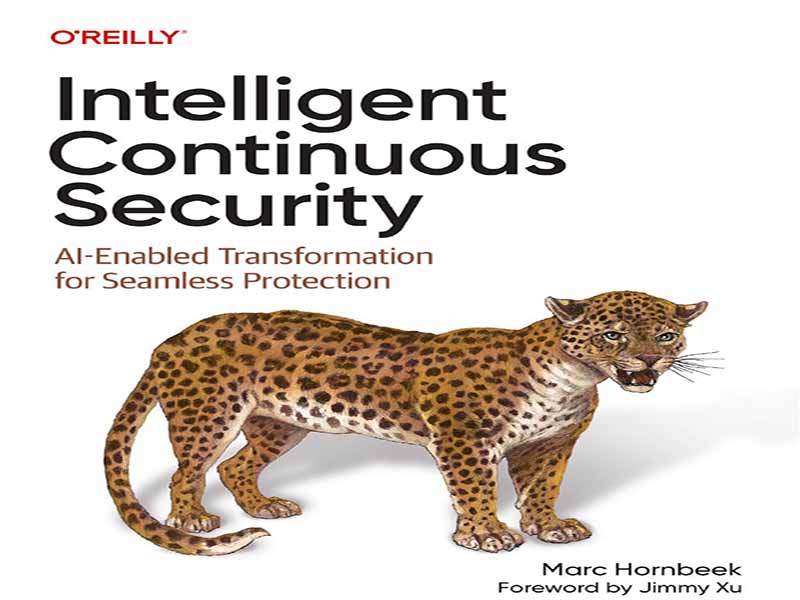- عنوان کتاب: Intelligent Continuous Security
- نویسنده: Marc Hornbeek
- حوزه: امنیت هوشمند
- سال انتشار: 2025
- تعداد صفحه: 562
- زبان اصلی: انگلیسی
- نوع فایل: pdf
- حجم فایل: 8.47 مگابایت
امنیت در توسعه و عملیات نرمافزار مدتهاست که به عنوان یک عملکرد مجزا در نظر گرفته میشود – چیزی که باید به برنامهها و زیرساختها متصل شود، نه اینکه از ابتدا در آنها طراحی شده باشد. تغییر به سمت DevSecOps برای رسیدگی به این موضوع و آوردن امنیت زودتر به چرخه عمر توسعه در نظر گرفته شده بود. اما حتی با این پیشرفت، امنیت همچنان تکهتکه باقی مانده است، به طوری که DevSecOps بر ایمنسازی خط لوله تمرکز دارد و SecOps پس از استقرار با تهدیدات مقابله میکند. این شکاف، سازمانها را در تلاش برای پیادهسازی امنیت به عنوان یک رشته واقعاً پیوسته و هوشمند – رشتهای که از آغاز کد تا محافظت در زمان اجرا را در بر میگیرد – قرار داده است. این کتاب، امنیت پیوسته هوشمند (ICS) را به عنوان راه حلی برای این چالش معرفی میکند و اتوماسیون مبتنی بر هوش مصنوعی، نظارت مداوم و مدلهای امنیتی تطبیقی را در یک استراتژی منسجم که امنیت را در کل چرخه عمر نرمافزار یکپارچه میکند، ادغام میکند. نیاز به ICS هرگز تا این حد زیاد نبوده است. تهدیدات سایبری با سرعت بیسابقهای در حال تکامل هستند و از کنترلهای امنیتی و مکانیسمهای پاسخگویی سنتی پیشی میگیرند. حملات مبتنی بر هوش مصنوعی، سازشهای زنجیره تأمین و پیچیدگیهای نظارتی، تیمهای امنیتی را ملزم به بازنگری در رویکرد خود میکند. ICS صرفاً کنترلهای امنیتی را بر روی گردشهای کاری موجود لایهبندی نمیکند؛ این کتاب، امنیت را به صورت کد، اتوماسیون و هوش در خود جای داده و آن را به یک عامل اصلی برای انعطافپذیری و چابکی کسبوکار تبدیل میکند. ICS با بهرهگیری از اتوماسیون مبتنی بر هوش مصنوعی، تشخیص تهدید پیشبینیکننده و اعتبارسنجی مداوم انطباق، به سازمانها کمک میکند تا از مدلهای امنیتی ایستا فراتر رفته و به سمت دفاعهای تطبیقی و خوددرمانگر حرکت کنند که با خطرات نوظهور همگام هستند. این کتاب برای متخصصان امنیت، مهندسان DevOps، رهبران فناوری اطلاعات و تصمیمگیرندگانی طراحی شده است که میخواهند از پیشرفتهای امنیتی تدریجی فراتر رفته و یک رویکرد جامع و مبتنی بر هوش مصنوعی را برای امنیت سایبری اتخاذ کنند. در طول فصلها، اصول، استراتژیها و پیادهسازیهای واقعی ICS را شرح میدهم، از جمله نحوه تجزیه سیلوهای بین DevSecOps و SecOps، نحوه اندازهگیری و بهینهسازی اثربخشی امنیتی و اینکه چگونه هوش مصنوعی میتواند همه چیز را از عملیات امنیتی به انطباق با مقررات تبدیل کند. این کتاب همچنین به چالشهای انسانی و سازمانی پذیرش ICS میپردازد و اذعان میکند که فناوری به تنهایی کافی نیست – بلکه نیاز به تغییر در فرهنگ، مهارتها و حاکمیت دارد. همانطور که در این سفر قدم میگذارید، شما را تشویق میکنم که به ICS نه به عنوان یک مقصد، بلکه به عنوان یک تکامل مداوم نگاه کنید. چشمانداز امنیت همچنان در حال تغییر خواهد بود، اما سازمانها با پذیرش اتوماسیون، هوش و همکاری میتوانند از قافله عقب نمانند. امید من این است که این کتاب هم به عنوان راهنما و هم به عنوان کاتالیزور عمل کند – و شما را قادر سازد تا معماریهای امنیتی بسازید که نه تنها قوی، بلکه هوشمند و سازگار در مواجهه با آیندهای نامشخص باشند.
Security in software development and operations has long been treated as a discrete function—something to be bolted on to applications and infrastructure rather than designed into them from the start. The shift toward DevSecOps was meant to address this, bringing security earlier into the development lifecycle. But even with this progress, security remains fragmented, with DevSecOps focusing on securing the pipeline and SecOps dealing with threats after deployment. This divide has left organizations struggling to implement security as a truly continuous and intelligent discipline—one that spans from code inception to runtime protection. This book introduces Intelligent Continuous Security (ICS) as a solution to this challenge, integrating AI-driven automation, continuous monitoring, and adaptive security models into a cohesive strategy that unifies security across the entire software lifecycle. The need for ICS has never been greater. Cyber threats are evolving at an unprecedented pace, outpacing traditional security controls and response mechanisms. AI-powered attacks, supply chain compromises, and regulatory complexities require security teams to rethink their approach. ICS does not simply layer security controls on top of existing workflows; it embeds security as code, as automation, and as intelligence, making it a core enabler of both resilience and business agility. By leveraging AI-driven automation, predictive threat detection, and continuous compliance validation, ICS helps organizations move beyond static security models toward adaptive, self-healing defenses that keep pace with emerging risks. This book is designed for security professionals, DevOps engineers, IT leaders, and decision makers who want to move beyond incremental security improvements and adopt a holistic, AI-assisted approach to cybersecurity. Throughout the chapters, I outline the principles, strategies, and real-world implementations of ICS, including how to break down silos between DevSecOps and SecOps, how to measure and optimize security effectiveness, and how AI can transform everything from security operations to regulatory compliance. The book also addresses the human and organizational challenges of ICS adoption, recognizing that technology alone is not enough —it requires a shift in culture, skills, and governance. As you embark on this journey, I encourage you to approach ICS not as a destination but as a continuous evolution. The security landscape will keep changing, but by embracing automation, intelligence, and collaboration, organizations can stay ahead of the curve. My hope is that this book will serve as both a guide and a catalyst— empowering you to build security architectures that are not just strong, but also intelligent and adaptive in the face of an uncertain future.
این کتاب را میتوانید از لینک زیر بصورت رایگان دانلود کنید:
Download: Intelligent Continuous Security




































نظرات کاربران